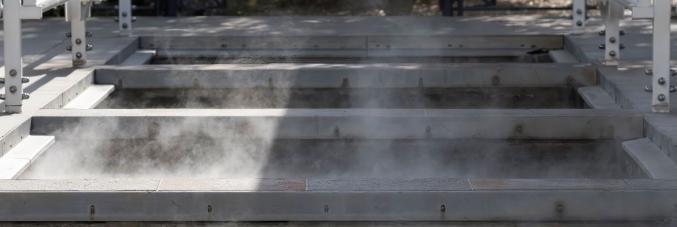
New tools for thermal biodiversity: database and strain collection
11.09.2025
The Pietro D'Abano Thermal Study Centre, in collaboration with the University of Padua, has developed the first digital database and the first strain collection dedicated to cyanobacteria from the thermal muds of the Euganean basin. These innovative tools, aimed at the scientific community and the public, enhance a unique biological heritage and strengthen the therapeutic dimension of thermal muds and waters.
Two distinct but complementary projects: a digital database that makes scientific information about thermal cyanobacteria accessible online, and a physical strain collection, a true "living library" of microorganisms, housed in the laboratories of the Plant Genome Editing and Phenotyping (PGE) facility at the Department of Biology. Both projects are nearing completion and represent, as emphasised by the scientific director of the Study Centre, Fabrizio Caldara, "two significant steps forward in research on thermalism and the enhancement of local microbiodiversity, which underpins the therapeutic properties of thermal muds and waters."
The online database, supported by the Municipality of Montegrotto Terme, will make scientific information about endemic cyanobacteria accessible: exclusive microorganisms of the Euganean basin, discovered and characterised thanks to over a decade of research activities. This tool is useful not only for researchers but also for citizens interested in discovering the extraordinary yet invisible dimension of thermal muds.
The strain collection preserves bacterial strains isolated from the muds in culture, offering the scientific community the opportunity to study these microorganisms, which are among the first organisms to appear on Earth and produce protective molecules with beneficial effects.
The study potential is not limited to thermalism: cyanobacteria, considered among the first organisms to appear on Earth, are now of interest for research on the origin of life and photosynthesis. Within the thermal muds, a biological memory of billions of years is preserved in living form. Nicoletta La Rocca, professor at the Department of Biology, who contributed to the isolation and genetic and functional characterisation of the species, explains that "cyanobacteria are extraordinary organisms. They were the first to develop oxygen on our planet, making the evolution of life as we know it possible. Furthermore, the species found in thermal areas, to survive the extreme environmental conditions partially similar to those of primordial Earth, produce protective molecules that are the basis of the beneficial effects of the Euganean muds.
These projects not only deepen the understanding of the healing properties of the muds but also explore new frontiers in natural pharmacology, biotechnology, and astrobiology, contributing to the promotion of high-quality thermalism.



